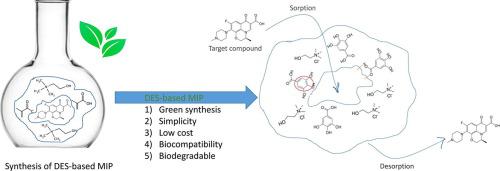Journal of Molecular Liquids ( IF 5.3 ) Pub Date : 2022-06-24 , DOI: 10.1016/j.molliq.2022.119696
Lawrence Mzukisi Madikizela , Somandla Ncube , Philiswa Nosizo Nomngongo , Vusumzi Emmanuel Pakade

|
分子印迹技术产生的选择性材料可广泛用于包括去除水污染物在内的各个领域。在分析化学中,该技术广泛用于固相萃取过程中选择性吸附剂的合成和色谱分离中固定相的制备。所得材料的好处包括可重复使用性、选择性和高吸附容量。在本研究中,我们回顾了使用深共晶溶剂 (DES) 在合成分子印迹聚合物 (MIP) 中的作用和益处,这些聚合物用于各种应用,包括它们在样品制备、色谱固定相和电化学传感中作为选择性吸附剂的作用. DES 已被用于 MIP 合成,以提高合成过程的绿色度,它们被用作功能单体、交联剂、致孔溶剂和改性剂。与市售吸附剂和不含 DES 的 MIP 相比,基于 DES 的 MIP 具有优异的吸附能力和选择性。此外,已发现 DES 增加了 MIP 表面中重要官能团的可用性,从而提高了它们的结合亲和力和选择性。未来研究的重点考虑因素包括 DES 在为各种分析物合成的 MIP 中的应用,以及对三元 DES 的更多研究,与二元 DES 相比,三元 DES 具有优异的性能。致孔溶剂和改性剂。与市售吸附剂和不含 DES 的 MIP 相比,基于 DES 的 MIP 具有优异的吸附能力和选择性。此外,已发现 DES 增加了 MIP 表面中重要官能团的可用性,从而提高了它们的结合亲和力和选择性。未来研究的重点考虑因素包括 DES 在为各种分析物合成的 MIP 中的应用,以及对三元 DES 的更多研究,与二元 DES 相比,三元 DES 具有优异的性能。致孔溶剂和改性剂。与市售吸附剂和不含 DES 的 MIP 相比,基于 DES 的 MIP 具有优异的吸附能力和选择性。此外,已发现 DES 增加了 MIP 表面中重要官能团的可用性,从而提高了它们的结合亲和力和选择性。未来研究的重点考虑因素包括 DES 在为各种分析物合成的 MIP 中的应用,以及对三元 DES 的更多研究,与二元 DES 相比,三元 DES 具有优异的性能。已发现 DES 可增加 MIP 表面中重要官能团的可用性,从而提高其结合亲和力和选择性。未来研究的重点考虑因素包括 DES 在为各种分析物合成的 MIP 中的应用,以及对三元 DES 的更多研究,与二元 DES 相比,三元 DES 具有优异的性能。已发现 DES 可增加 MIP 表面中重要官能团的可用性,从而提高其结合亲和力和选择性。未来研究的重点考虑因素包括 DES 在为各种分析物合成的 MIP 中的应用,以及对三元 DES 的更多研究,与二元 DES 相比,三元 DES 具有优异的性能。

"点击查看英文标题和摘要"































 京公网安备 11010802027423号
京公网安备 11010802027423号